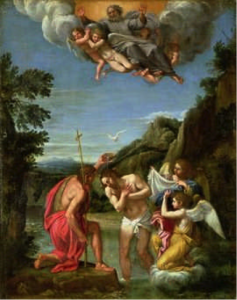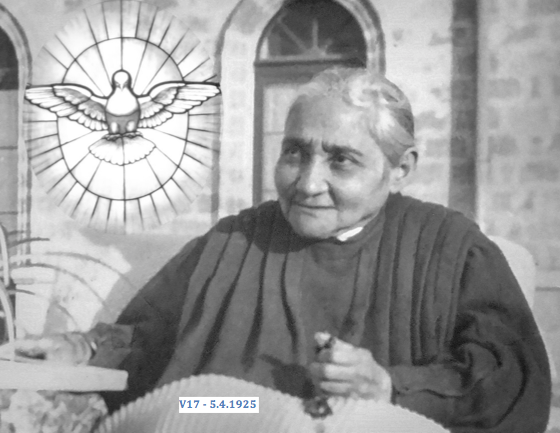
FEAST OF THE BAPTISM OF THE LORD
Mystery of the Lord’s Baptism–Maximus of Turin
The Gospel tells us that the Lord went to the Jordan River to be baptized and that He wished to consecrate Himself in the river by signs from Heaven.
Reason demands that this Feast of the Lord’s Baptism, which I think could be called the Feast of His Birthday, should follow soon after the Lord’s Birthday, during the same season, even though many years intervened between the two events.
At Christmas He was born a man; today He is reborn sacramentally. Then He was born from the Virgin; today He is born in mystery. When He was born a man, his Mother Mary held him close to Her heart; when He is born in mystery, God the Father embraces Him with His Voice when He says: This is My beloved Son in whom I AM well pleased: listen to Him. The Mother caresses the tender Baby on Her lap; the Father serves his Son by His Loving testimony. The Mother holds the Child for the Magi to adore; the Father reveals that His Son is to be worshiped by all the nations.
That is why the Lord Jesus went to the river for baptism, that is why he wanted His Holy Body to be washed with Jordan’s water.
Someone might ask, “Why would a Holy man desire baptism?” Listen to the answer: Christ is baptized, not to be made Holy by the water, but to make the water Holy, and by His cleansing to purify the waters which he touched. For the consecration of Christ involves a more significant consecration of the water.
For when the Savior is washed all water for our baptism is made clean, purified at its source for the dispensing of Baptismal Grace to the people of future ages. Christ is the first to be baptized, then, so that Christians will follow after him with confidence.
I understand they mystery as this. The column of fire went before the sons of Israel through the Red Sea so they could follow on their brave journey; the column went first through the waters to prepare a path for those who followed. As the apostle Paul said, what was accomplished then was the Mystery of Baptism. Clearly it was baptism in a certain sense when the cloud was covering the people and bringing them through the water.
But Christ the Lord does all these things: in the column of fire He went through the sea before the sons of Israel; so now, in the column of His Body, He goes through baptism before the Christian people. At the time of the Exodus the column provided light for the people who followed; now it gives light to the hearts of believers. Then it made a firm pathway through the waters; now it strengthens the footsteps of faith in the bath of baptism.
EPIPHANIES OR MANIFESTATIONS OF JESUS CHRIST AND HIS HOLY DIVINE WILL
Christ’s Birth
(Luke 2: 10-14)
“Do not be afraid, for behold, I bring you good news of great joy which shall be to all the people; for today in the town of David a Savior has been born to you, Who is Christ the Lord. And this shall be a sign to you: you will find an Infant wrapped in swaddling clothes and lying in a manger.” And suddenly there was with the angel a multitude of heavenly host praising God and saying, “Glory to God in the highest, and on earth peace among men of good will.”
FROM THE BOOK OF HEAVEN
12/25/37 – Vol. 35
(Luisa) “Little daughter of My Will, the Feast of My Birth was the Feast—the beginning of the Feast—of My Divine Will. As the Angels were singing, ‘Glory to God in the highest Heavens, and Peace on earth to the men of good will,’ all Angels and the Creation assumed a festive mode and, while celebrating My Birth, they celebrated the Feast of My Divine Will. In fact, with My Birth, Our Divinity received True Glory unto the highest Heavens; and men will have the True Peace, when they will recognize My Will, giving It Dominion and allowing It to Reign. Only then, will they feel My Will as Good—will they feel the Divine Strength; only then, will Heaven and earth sing together: ‘Glory to God in the highest Heavens, and Peace on earth to the men who will possess the Divine Will.’ All will Abound in these men, and they will possess the True Peace.”
CHRIST’S EPIPHANY TO THE HOLY MAGI
(Matthew 2: 1-12)
“And behold, the Star that they had seen in the East went before them, until it came and stood over the place where the Child was. And when they saw the Star they rejoiced exceedingly. And entering the house, they found the Child with Mary His mother, and falling down they worshipped Him. (Here genuflect). And opening their treasures they offered Him gifts of gold, frankincense and myrrh. And being warned in a dream not to return to Herod, they went back to their own country by another way.”
FROM THE BOOK OF HEAVEN
1/6/27 – Vol. 20
Then, after this, I was thinking about the Holy Magi, when they visited the little baby Jesus in the grotto of Bethlehem; and my always lovable Jesus told me: “My daughter (Luisa), see the order of My Divine Providence: for the great Portent of My Incarnation, I chose and used a Virgin, humble and poor; and the Virgin Saint Joseph as My custodian, who acted as a father to Me, and who was so poor that he needed to work in order to sustain our lives. See how in the greatest Works – and the Mystery of the Incarnation could not be greater – We use people whose outward appearance attracts no attention from anyone, because dignities, scepters, riches, are always fumes which blind the soul, and prevent her from penetrating into the Celestial Mysteries in order to receive a great Act of God – and God Himself. But in order to Manifest to the peoples the coming of Myself, Word of the Father, upon earth, I wanted and used royal authorities, learned and erudite men, so that, by their authority, they might diffuse the Knowledges of the Incarnate God and, eventually, also impose themselves to the peoples. In spite of this, the Star was seen by everyone, yet only three of them move, pay attention and follow it. This says that, among all, these alone possessed a certain dominion over themselves, which formed a little empty space in their interior. So, beyond the appearance of the Star, they felt My Call which echoed within their interior; and heedless of sacrifices, of gossip, of mockeries – because they were leaving for an unKnown place and they had to hear much of it – disregarding everything and dominating themselves, they followed the Star united to My Call, which resounded in their interior as more than a speaking Star. It enlightened them, it attracted them, and said many things about the One whom they were to visit; and, drunk with joy, they followed the Star.
See then, how in order to give the great Gift of the Incarnation, it took a Virgin who had no human will, who was more of Heaven than of earth, and who was disposed to this great portent by a continuous miracle. So, We had no need of external things and of human appearances, which might draw the attention of the peoples. However, in spite of this, also to Manifest Myself, I wanted men who had dominion over themselves, and who would make a little space within their interior, to let the echo of My Call resound in it. But what was not their surprise in seeing the Star stop, not over a royal palace, but over a vile hovel? They did not know what to think, and convinced themselves that there was a mystery – not human, but Divine. When they animated themselves with faith, entered the grotto and, kneeling, adored Me, as they bent their knees, I revealed Myself, and I let my Divinity shine forth from my little Humanity, and they recognized Me as the King of kings – the One who had come to save them. Immediately, they offered themselves to serve Me and to lay down their lives for love of Me; but My Will made Itself Known, and sent them again into their region, to let them be the messengers of My coming upon earth in the midst of those peoples. See then, how necessary dominion of oneself and emptiness of heart are, to let My Call resound, and to be fitting for knowing the Truth and for Manifesting it to others.”
THE MANIFESTATION OF JESUS AT HIS BAPTISM
Matthew 3: 13-17
“Then Jesus came from Galilee to John, at the Jordan to be baptized by him. And John was for hindering him and said, “It is I who ought to be baptized by thee, and dost thou come to me?” But Jesus answered and said to him, “Let it be so now, for so it becomes us to fulfill all justice.” Then he permitted him. And when Jesus had been baptized He immediately came up from the water. And behold, the heavens were opened to Him, and he saw the Spirit of God descending as a dove and coming upon Him. And behold, a voice from the heavens said, “This is My beloved Son, in whom I AM well pleased.”
JESUS’ MANIFESTATION OF THE MOST HOLY DIVINE WILL TO THE SERVANT OF GOD, LUISA PICCARRETA
FROM THE BOOK OF HEAVEN
3/20/32 – Vol. 30
Three necessary conditions in order to obtain the Kingdom of the Divine Will. How all live in the Divine Will. Different way of Living.
“My daughter (Luisa), to know My Divine Will is the Greatest thing that I can give and that the creature can receive; and Its Reigning is the Confirmation of Its Great Gift and the carrying out of Its Will that was Known. Therefore, it is necessary to ask for It; by asking for It, she disposes herself, she forms within herself the Royal Palace in which to receive It; by asking for It, she acquires the Love in order to Love It, she acquires the qualities of Sacrifice that are needed in order to possess It. And as one asks for It, the human will loses its ground, it is debilitated, it loses strength and disposes itself to receive the Dominion of the Supreme Volition; and God, seeing Himself prayed, disposes Himself to give It.
“It takes the dispositions of both sides in order for Us to give Our Celestial Gifts. How many Gifts do We want to give! But because they are not asked for, We retain Them within Ourselves, waiting to give Them when they are asked for. By asking, it is as if commerce were opened between Creator and creature. If one does not ask, the commerce is closed, and Our Celestial Gifts do not descend in order to put themselves in circulation on the face of the earth. Therefore, the first indispensable necessity in order to obtain the Kingdom of the Divine Will is to ask for It with Incessant prayers, because, as they pray, so are We reached by little letters—now of solicitation, now of supplication, now of the agreement that they want to make with Our Will, until the last letter comes, of the final accord.
“Second necessity, more indispensable than the first, in order to obtain this Kingdom: it is necessary to know that one can have It. Who can ever think of a Good, desire it, love it, if he does not know that he can obtain it? No one. If the Ancients had not Known that the future Redeemer was to come, no one would have given it a thought, nor prayed, nor hoped for salvation, because the salvation, the sanctity of those times, was fixed—centralized in the future Celestial Savior. Outside of this there was no good to be hoped for. To know that one can have a Good forms the Substance, the Life, the Nourishment of that Good in the creature. Here is the reason for the so many Knowledges about My Will that I have Manifested to you—that it may be Known that they can have the Kingdom of My Will. When it is Known that a Good can be possessed, arts and industriousness are used, and the means to obtain the intent are employed.
“The third necessary means is to know that God wants to give this Kingdom. This lays the foundations, the sure Hope in order to obtain It, and forms the final preparations in order to receive the Kingdom of My Divine Will. When a Good is wanted and longed for, to know that the one who can give it already wants to give it, can be called the last blow of Grace, and final act, to obtain what is wanted. In fact, had I (Jesus) not Manifested to you (Luisa) that I can give and want to give My Divine Will as Dominating and Reigning in the midst of creatures, you would have remained indifferent like everyone else toward a Good so Great. So, your interest, your prayers, have been effects of, and Births from, what you have Known.
“And I Myself, when I came upon earth, during the thirty years of My hidden Life—it can be said that, in appearance, I did no good to anyone, nor did a single one know Me. I was, yes, in their midst, but unobserved; all the Good unfolded between Me and the Celestial Father, My Celestial Mother and dear Saint Joseph, because they knew He who I was; everybody else—nothing. But when I came out of My hiding place, and I openly made Myself Known, saying that I was truly the Promised Messiah, their Redeemer and Savior, even though by making Myself Known I drew upon Myself calumnies, persecutions, contradiction, anger, hatred from the Jews, and My very Passion and Death, with all these evils that rained down upon Me like pouring rain, it came to be that I, by making Myself Known, affirmed who I was in Reality—the Eternal Word descended from Heaven in order to save them. And this is so true, that as long as I remained in the House of Nazareth, not knowing who I was, no one told Me anything, nor did they slander Me or do Me any harm; as I revealed Myself, all evils swooped down upon Me. But this, making Myself Known, was necessary, otherwise I would have departed back for Heaven without accomplishing the Purpose for which I had come upon earth.
“On the other hand, by making Myself Known, even though I drew so many evils upon Myself, in the midst of this chasm of evils I formed My Apostles, I announced the Gospel, I performed Prodigies, and the Knowledge of Me instigated My enemies to make Me suffer so many pains, to the point of giving Me death on the Cross. But I obtained My Intent—that many would know Me in the midst of many who did not want to know Me; and the Fulfillment of My Redemption. I knew that, by making Myself Known, the perfidy and pride of the Jews would do all that to Me, but making Myself Known was necessary, because a person, a Good, if it is not Known, is not bearer of Life or of Good. The Good, the Truth, not Known, remain hampered within themselves, without fecundity, like many sterile mothers whose offspring ends with them.
“See, then, how necessary it is that it be Known that I can give the Kingdom of My Will, and that I want to give It. I can say that it enters the same necessity as that of making Known that I was the Son of God who came upon earth. It is yet true that many, in knowing this, will repeat what they did to Me when I made Myself Known as the longed-for Messiah: calumnies, contradiction, doubts, suspicions, scorns, as indeed they have done already, as soon as the beginning of the printing showed signs of making My Divine Will Known. But this says nothing; it is the Good that possesses the Strength that wounds evil; and so creatures, and hell, feeling wounded, arm themselves against Good and would want to annihilate Good, as well as she or he who wants to make that Good Known. But in spite of everything that they wanted in the first beginning—having as though suffocated, upon Its wanting to rise, the Knowledge of My Will and Its wanting to Reign—yet It did take Its first Steps, and what some did not believe, others have believed. The first Steps will call for the second, the third, and so forth, although those who will raise contradiction and doubts will not be lacking. But it is of absolute necessity that My Divine Will, and that I can give It, and that I want to give It, be Known.
“These are the conditions without which God cannot give what He wants to give, and the creature cannot receive it. Therefore pray, and do not hold yourself back from making My Divine Will Known. Time, circumstances, things, people, change—they are not always the same; therefore, what is not obtained today can be obtained tomorrow—to the confusion, however, of those who have suffocated a Good so Great. But My Will will Triumph and will have Its Kingdom upon earth.”


